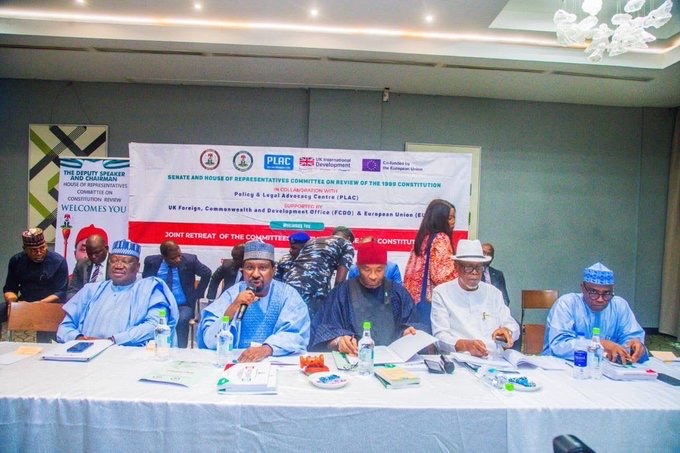Nigeria’s political landscape may be heading for a significant transformation. The House of Representatives Committee on Constitution Review has received proposals for the creation of 31 new states across the federation, which would increase Nigeria’s states from 36 to 67 if approved. This development has sparked intense debate about representation, governance costs, and the political motivations behind these proposals.
The Current Proposals: A Comprehensive Overview
The proposed 31 new states are distributed across Nigeria’s six geopolitical zones: five from the North-Central, four from the North-East, five from the North-West, five from the South-East, four from the South-South, and seven from the South-West.
Key Proposals by Region
South-East Region has the most aggressive push for new states, addressing the long-standing imbalance where it has only five states compared to other regions with six or seven. Proposed states include Etiti State, Adada State from Enugu, Urashi State, Orlu State, and Aba State. The Adada State bill, sponsored by Senator Okey Ezea, would be carved from Enugu North senatorial district comprising six local government areas: Igbo-Eze North, Igbo-Eze South, Udenu, Nsukka, Igga, and Uzo-Uwani.
South-West Region proposals reflect ethnic and economic considerations. The Oke-Ogun state would be carved from Oyo State and comprise 12 local government areas including Olorunsogo, Irepo, Ogbomosho North, and Saki-East. Other proposals include Ijebu State from Ogun State sponsored by Senator Gbenga Daniel, which is reportedly gaining significant traction and expected to receive presidential approval soon, and Ife-Ijesa State from Osun State.
South-South and Other Regions include Anioma State from Delta State sponsored by Senator Ned Nwoko, and Coastal State from Ondo State. The North-Central proposals include Okun, Okura, and Confluence States from Kogi, Benue Ala and Apa States from Benue, while the North-East would see Amana State from Adamawa and Savannah State from Borno.
Constitutional Requirements: The High Bar for State Creation
Section 8 of the 1999 Constitution establishes a rigorous process for state creation. Understanding these requirements reveals why state creation is intentionally difficult.
First, at least two-thirds of legislative representatives from the area seeking statehood must support the request in the Senate, House of Representatives, state House of Assembly, and local government councils within the affected area. After legislative approval, a referendum must be conducted in the proposed area where at least two-thirds of residents must vote in favor of the new state.
The referendum results must then be endorsed by a simple majority of all state Houses of Assembly across Nigeria—meaning at least 19 of 36 states must approve. Finally, the National Assembly must give final approval with a two-thirds majority in both chambers.
This rigid amendment process is designed to protect fundamental constitutional principles, prevent factional tyranny, ensure stability, and reflect Nigeria’s federal character by guaranteeing that constituent states’ interests are adequately considered.
However, Deputy Speaker Benjamin Kalu revealed that currently, no state creation request meets these constitutional requirements. This admission underscores the gap between political agitation and constitutional compliance.
The Economic Reality: Can Nigeria Afford More States?
The timing of these proposals has raised serious concerns given Nigeria’s precarious fiscal situation. As of March 31, 2025, Nigeria’s total public debt had ballooned to N149.39 trillion, up 22.8 percent year-on-year from N121.67 trillion. The 2025 budget contains a deficit of N13.39 trillion, with debt servicing estimated at N16.3 trillion.
In the 2025 budget, the Federal Government plans to spend N8.52 trillion on staff salaries and pensions alone. Media reports indicate that by November 2023, 13 states—just one-third of Nigeria’s states—planned to spend N3.87 trillion on workers’ salaries and pensions.
More than 20 of Nigeria’s 36 states are unable to finance 20 percent of their budgets from internally generated revenue, with most depending heavily on monthly Federal Account Allocation Committee (FAAC) disbursements. Only Lagos and Rivers States are outliers, covering around 70 percent of their expenses through IGR.
Nigerian states currently owe over N11 trillion in debts, while the federal government owes over N134 trillion. Adding 31 new states would mean creating new governors’ offices, state assemblies, judiciaries, civil services, and all accompanying infrastructure—exponentially increasing an already unsustainable cost of governance.
Political Motivations and Criticisms
The state creation debate has attracted sharp criticism from observers who question the true motivations behind these proposals.
Leading regional organizations such as Yoruba socio-cultural group Afenifere and the Arewa Consultative Forum dismissed the proposals as unrealistic and politically driven. Maryam Ibrahim, a lawyer and civic rights activist, explained that many memoranda rely on ethnic and sentimental grounds rather than strict legal criteria required for constitutional amendments.
Close to N26.8 billion has been expended by the Senate and House of Representatives on constitutional review exercises since 1999, with each National Assembly regime approving approximately N4 billion for this purpose. Critics note that despite these massive expenditures, key reforms like state police, local government autonomy, and electoral reforms repeatedly fail to pass.
A concerning pattern has emerged where almost every deputy Senate President or Deputy Speaker who chaired constitutional review committees ended up running for governor—including Emeka Ihedioha, Ike Ekweremadu, and Ovie Omo-Agege. The current Deputy Speaker Benjamin Kalu, who chairs the present committee, is reportedly eyeing the same path.
One analyst observed: “State creation won’t fix corruption, weak institutions, or political exclusion. Nigeria’s challenge is not the number of states, but the quality of governance.”
The South-East Question: A Special Case?
The South-East’s agitation for additional states carries particular weight due to historical imbalance. While other geopolitical zones have six or seven states, the South-East has only five, leading to perceived marginalization in federal resource allocation and political representation.
The proposals aim to address long-standing regional demands and improve governance in areas with deep cultural, historical, and economic importance. Proponents argue that creating additional South-Eastern states would rectify this structural inequity and bring development closer to the people.
However, critics counter that the solution lies not in multiplying administrative units but in restructuring Nigeria’s fiscal federalism, enhancing local government autonomy, and improving governance quality at existing levels.
What Happens Next?
The Constitution Review Committee has received over 200 bills seeking alterations to the 1999 Constitution, with some progressing to second reading and others at first reading. The committee plans to embark on zonal public hearings across Nigeria’s six geopolitical zones and has partnered with organizations to open a situation room to monitor operations and address citizens’ concerns.
Benjamin Kalu, chairman of the House Committee on Constitution Review, announced that the constitutional amendment would be completed in December 2025. However, given the stringent constitutional requirements and current fiscal realities, the likelihood of these proposals becoming reality remains uncertain.
The process requires not just National Assembly approval but referendum victories in proposed areas and endorsement by at least 19 state assemblies—a formidable political hurdle requiring unprecedented consensus across Nigeria’s diverse and often divided political landscape.
The Broader Implications
Beyond the immediate question of whether these specific proposals will succeed, the debate highlights fundamental tensions in Nigeria’s federal structure:
Representation vs. Viability: How do you balance demands for closer-to-home governance with fiscal sustainability?
Ethnic Identity vs. National Integration: Should states be created along ethnic lines, or does this further fragment national cohesion?
Political Expediency vs. Genuine Reform: Are these proposals driven by genuine governance concerns or political calculations?
Cost of Governance vs. Cost of Development: With limited resources, should Nigeria prioritize expanding government or developing existing infrastructure?
These questions don’t have easy answers, but they’re essential to understanding what’s truly at stake in Nigeria’s state creation debate.
Conclusion
The Nigerian constitution has established clear procedures for state creation, requiring two-thirds support from affected area legislators, a referendum with two-thirds approval, endorsement from at least half of Nigeria’s states, and final approval by two-thirds of the National Assembly.
While the 31 proposed states represent genuine regional aspirations and long-standing grievances about representation and resource allocation, they collide with harsh economic realities. Nigeria’s mounting debt, revenue challenges, and already high cost of governance raise serious questions about the wisdom and feasibility of expanding from 36 to 67 states.
The debate will continue throughout 2025 as the National Assembly conducts public hearings and deliberates on constitutional amendments. Whether driven by genuine reform impulses or political positioning, these proposals have reignited important conversations about federalism, governance, and Nigeria’s political future.
No schema found.For ordinary Nigerians, the key question remains: Will more states translate to better governance and improved quality of life, or simply more governors, more legislators, and more of the same challenges spread across more administrative units?
References
- Eaglesforesight. (2025). “Check Full List Of Proposed New States In Nigeria.” Retrieved from https://eaglesforesight.com/check-full-list-of-proposed-new-states-in-nigeria/
- Businessday NG. (2025). “Full list: 31 new Nigerian states proposed by House of Reps.” Retrieved from https://businessday.ng/news/article/full-list-31-new-nigerian-states-proposed-by-house-of-reps/
- Daily Post Nigeria. (2025). “Nigerian lawmakers propose creation of 31 additional states [Full List].” Retrieved from https://dailypost.ng/
- Legit.ng. (2024). “Oke-Ogun, Adada, 5 other proposed new states in Nigeria.” Retrieved from https://www.legit.ng/
- Businessday NG. (2025). “Senate weighs proposals for 31 new states despite Nigeria’s fiscal crisis.” Retrieved from https://businessday.ng/
- Channels Television. (2025). “Reps Committee Proposes Creation Of 31 More States.” Retrieved from https://www.channelstv.com/
- Federal Republic of Nigeria. (1999). “Constitution of the Federal Republic of Nigeria.” Retrieved from http://www.nigeria-law.org/ConstitutionOfTheFederalRepublicOfNigeria.htm
- Zikoko. (2025). “Nigeria Might Be Getting 31 New States; Here’s All You Need To Know.” Retrieved from https://www.zikoko.com/citizen/nigeria-might-be-getting-31-new-states/
- Nigerian Lawyers Center. (2025). “Legal Procedure for Constitutional Amendment in Nigeria.” Retrieved from https://nigerianlawyerscenter.com/
- Legit.ng. (2025). “Referendum, other constitutional requirements to create new state.” Retrieved from https://www.legit.ng/
- The Authority News. (2025). “Who really benefits from Nigeria’s endless Constitutional Review?” Retrieved from https://authorityngr.com/
- Independent Newspaper Nigeria. (2025). “The Constitution And Cost Of Governance.” Retrieved from https://independent.ng/
- Nairametrics. (2025). “Reps committee proposes creation of 31 additional states in Nigeria.” Retrieved from https://nairametrics.com/
- ConstitutionNet. “Nigeria’s constitution review committee recommends creating new states.” Retrieved from https://constitutionnet.org/
- Voice of Nigeria. (2025). “State Creation: No Request Meets Constitutional Requirements – Deputy Speaker.” Retrieved from https://von.gov.ng/




